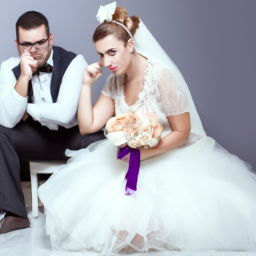The Importance of Reflecting on Your Decision: Was Getting Married a Mistake?
Marriage is a significant life event that can bring immense joy, fulfillment, and companionship. However, it is not uncommon for individuals to question whether getting married was a mistake at some point in their lives. Reflecting on this decision is crucial to gain insight into your feelings and emotions, assess your relationship, and make informed choices for your future. In this article, we will guide you through the process of analyzing whether getting married was a mistake or not.
Understanding Your Feelings
Before delving into the analysis, it is essential to acknowledge and understand your feelings. Marriage is a complex institution that involves various emotions, expectations, and responsibilities. Take the time to reflect on your current emotions and identify any recurring doubts or concerns you may have. Are you feeling unhappy, trapped, or unfulfilled in your marriage? Do you find yourself constantly questioning your decision to get married? Recognizing and accepting these emotions is the first step towards finding clarity.
It is crucial to remember that questioning whether getting married was a mistake does not necessarily mean that it was. It is natural for individuals to experience doubts and uncertainties in any significant life decision. By acknowledging your feelings, you can begin the process of introspection and analysis.
Consider keeping a journal or engaging in conversations with a trusted friend or therapist to help you articulate and process your emotions. This can provide valuable insights and facilitate a deeper understanding of your thoughts and concerns.
Assessing Your Relationship
Once you have gained a better understanding of your feelings, it is time to assess your relationship. Reflect on the dynamics, communication patterns, and overall satisfaction within your marriage. Ask yourself the following questions:
1. Are you and your partner able to effectively communicate and resolve conflicts?
2. Do you feel supported, respected, and valued in your relationship?
3. Are there any patterns of emotional or physical abuse?
4. Are your goals, values, and aspirations aligned with your partner’s?
5. Do you share common interests and enjoy spending time together?
Honestly answering these questions can provide valuable insights into the health and compatibility of your relationship. It is important to remember that no relationship is perfect, and every marriage requires effort and compromise. However, identifying significant issues or recurring patterns of unhappiness can help you evaluate whether getting married was a mistake.
If you find that your relationship is characterized by constant conflict, lack of trust, or emotional abuse, it may be necessary to seek professional help or consider the possibility of separation or divorce. Remember, your emotional well-being and happiness should always be a priority.
Considering the Future
After reflecting on your feelings and assessing your relationship, it is essential to consider the future. What do you envision for yourself? Are there any changes or improvements you would like to see in your marriage? Reflecting on your desires and aspirations can help you determine whether getting married was a mistake or if there is potential for growth and happiness.
If you believe that your marriage can be salvaged and improved, consider discussing your concerns and feelings with your partner. Open and honest communication is key to resolving conflicts and fostering a healthy relationship. Couples therapy or marriage counseling can also provide a supportive environment to address underlying issues and work towards a more fulfilling marriage.
However, if you have thoroughly analyzed your feelings, assessed your relationship, and still find that getting married was a mistake, it may be necessary to consider alternative options. Every individual deserves to be in a loving and fulfilling relationship, and sometimes that may mean making difficult decisions for your own well-being.
Ultimately, only you can determine whether getting married was a mistake or not. Reflecting on your decision, understanding your feelings, assessing your relationship, and considering the future are crucial steps in gaining clarity and making informed choices. Remember, self-reflection and personal growth are continuous processes, and it is never too late to prioritize your happiness and well-being.

Signs to Look Out for When Wondering if Getting Married Was a Mistake
Marriage is a significant commitment that requires careful consideration and introspection. While many couples find happiness and fulfillment in their marriages, others may question whether getting married was a mistake. If you find yourself in this situation, it is essential to evaluate your feelings and assess the signs that may indicate potential issues in your relationship. In this article, we will guide you through the process of identifying signs that could suggest getting married was a mistake.
1. Lack of Communication
Effective communication is the foundation of a healthy and successful marriage. If you and your spouse struggle to communicate openly and honestly, it can lead to misunderstandings, resentment, and feelings of isolation. Signs of communication issues may include avoiding difficult conversations, frequent arguments without resolution, or feeling unheard and misunderstood.
In order to address this, it is crucial to create a safe space for open dialogue. Consider seeking professional help from a couples therapist who can guide you in improving your communication skills and help you reconnect on a deeper level. Remember, effective communication is key to resolving conflicts and maintaining a strong bond in your marriage.
Additionally, make an effort to actively listen to your partner’s concerns, validate their feelings, and express your own emotions in a calm and respectful manner. By fostering a culture of open communication, you can work together to overcome any challenges that may arise.
2. Lack of Emotional Intimacy
Emotional intimacy is the ability to connect with your partner on a deep emotional level, sharing vulnerabilities, dreams, and fears. If you feel emotionally disconnected from your spouse, it can be a sign that getting married was a mistake. Emotional intimacy is essential for a fulfilling and long-lasting marriage, as it strengthens the bond between partners and promotes a sense of security and trust.
Signs of a lack of emotional intimacy may include feeling emotionally neglected, a lack of interest in each other’s lives, or a sense of loneliness within the relationship. It is crucial to address these issues early on to prevent further emotional distance.
Start by creating intentional moments of emotional connection, such as setting aside quality time to talk and share your thoughts and feelings. Engage in activities that you both enjoy and encourage open and honest conversations about your hopes, dreams, and fears. Remember, building emotional intimacy takes time and effort from both partners, but it is a vital aspect of a healthy and fulfilling marriage.
3. Constant Resentment and Discontent
Resentment and constant discontentment can poison a marriage and indicate that getting married was a mistake. If you find yourself constantly resenting your partner or feeling dissatisfied with your relationship, it is essential to address these emotions before they lead to irreparable damage.
Signs of resentment and discontentment may include a lack of appreciation for each other, constant criticism, or a feeling of being taken for granted. These negative emotions can erode the foundation of your marriage and create a toxic environment.
To overcome these challenges, it is crucial to practice gratitude and appreciation. Make a conscious effort to acknowledge and express gratitude for your partner’s positive qualities and actions. Additionally, work together to identify and address the underlying issues causing resentment. Seeking the guidance of a marriage counselor can be beneficial in navigating these complex emotions and finding constructive solutions.
Remember, addressing and resolving resentment and discontentment requires open communication, empathy, and a willingness to make necessary changes for the betterment of your relationship.
In conclusion, if you find yourself questioning whether getting married was a mistake, it is important to evaluate the signs that may indicate potential issues in your relationship. Lack of communication, emotional intimacy, constant resentment, and discontentment are just a few signs to look out for. Remember, seeking professional help from a couples therapist can provide valuable guidance and support in navigating these challenges. Ultimately, the decision to stay in or leave a marriage is deeply personal, and it is essential to prioritize your own happiness and well-being.

Marriage is a significant life decision that can have a profound impact on our overall happiness and well-being. Unfortunately, not all marriages turn out to be the fairy tale we envisioned. If you find yourself questioning whether getting married was a mistake, it’s important to address these feelings and navigate through the process of coping with regret. In this article, we will explore different strategies to help you navigate the complex emotions associated with marrying the wrong person.
Understanding Your Feelings
Before diving into coping mechanisms, it’s crucial to take the time to understand your feelings and reflect on your situation. It’s normal to experience doubt and regret after making such a significant commitment. By acknowledging and accepting these emotions, you can begin to process them in a healthy way.
One way to gain clarity is to identify the specific reasons why you feel you may have married the wrong person. Are there fundamental differences in values, goals, or compatibility? Did you ignore any warning signs or red flags? Understanding the root causes of your regret can help you make sense of your emotions and pave the way for healing.
It can also be helpful to seek professional guidance through therapy or counseling. A trained therapist can provide an objective perspective and help you navigate the complexities of your emotions. They can assist you in exploring your doubts, fears, and regrets, enabling you to gain insights and develop coping strategies.
Exploring Your Options
Once you have a clearer understanding of your feelings, it’s essential to explore your options. This may involve having open and honest conversations with your partner about your concerns. Communication is key in any relationship, and expressing your doubts can potentially lead to a better understanding between both parties.
If you find that your concerns are not being addressed or resolved, you might consider seeking professional help as a couple. Marriage counseling can provide a safe space for open dialogue and facilitate effective communication. A skilled therapist can guide you and your partner through the process of exploring your issues, rebuilding trust, and making informed decisions about the future of your relationship.
However, in some cases, despite your best efforts, you may come to the realization that ending the marriage is the best course of action. This can be an incredibly difficult decision to make, but it’s important to prioritize your own well-being and happiness. Seeking legal advice and support from friends and family can be invaluable during this challenging time.
Embracing Self-Care and Healing
Regardless of the path you choose, coping with the regret of marrying the wrong person requires self-care and healing. It’s essential to prioritize your mental and emotional well-being during this challenging period.
Engaging in activities that bring you joy and fulfillment can help redirect your focus and promote healing. Whether it’s pursuing hobbies, spending time with loved ones, or practicing self-reflection through meditation or journaling, finding healthy outlets for your emotions is crucial.
Additionally, seeking support from friends, family, or support groups can provide a sense of community and understanding. Surrounding yourself with individuals who have experienced similar situations can offer valuable insights and empathy.
Remember, healing takes time, and it’s important to be patient with yourself. Allow yourself to grieve the loss of the relationship and the dreams you had for your marriage. By embracing self-care and seeking support, you can gradually move forward and create a brighter future for yourself.
In conclusion, coping with regret after marrying the wrong person is a challenging and deeply personal journey. By understanding your feelings, exploring your options, and embracing self-care, you can navigate through the complex emotions associated with this experience. Remember, you are not alone, and seeking professional help or support from loved ones can make a significant difference in your healing process. Ultimately, by prioritizing your own well-being and happiness, you can find the strength to move forward and create a fulfilling life.

Seeking Professional Help: When to Consider Marriage Counseling after Feeling like Getting Married Was a Mistake
Marriage is a significant decision that can have a profound impact on our lives. While many marriages thrive and bring happiness, there are instances where individuals may start questioning if getting married was a mistake. It’s important to remember that doubts and uncertainties are common in any relationship, but when these feelings persist and begin to affect your overall well-being, seeking professional help in the form of marriage counseling can be a beneficial step forward.
Understanding the Significance of Marriage Counseling
Marriage counseling provides a safe and supportive environment for couples to address their issues, improve communication, and work towards resolving conflicts. It is a collaborative process that involves a trained therapist who specializes in helping couples navigate through the challenges they face in their relationship.
Here are some key factors to consider when determining if it’s the right time to seek marriage counseling:
1. Persistent Feelings of Regret and Doubt
If you find yourself constantly questioning your decision to get married and experiencing feelings of regret, it may be a sign that professional intervention is necessary. These persistent doubts can create a significant strain on your emotional well-being and the overall health of your relationship. Marriage counseling can help you explore these doubts and gain clarity on whether your concerns are valid or if they stem from other underlying issues.
During counseling sessions, you and your spouse will have the opportunity to express your feelings openly and honestly. A skilled therapist can guide you through a process of self-reflection and assist you in understanding the root causes of your doubts. This self-discovery can lead to a deeper understanding of yourself and your relationship, ultimately helping you make an informed decision about the future of your marriage.
2. Communication Breakdown
Effective communication is the foundation of a healthy and successful marriage. If you and your spouse are struggling to communicate effectively, it can lead to misunderstandings, resentment, and a breakdown of trust. Marriage counseling can provide you with the tools and techniques to improve your communication skills and rebuild a strong foundation for your relationship.
A marriage counselor will help you identify and address the underlying issues that contribute to communication breakdown. They will teach you active listening techniques, conflict resolution strategies, and effective ways to express your needs and concerns. By learning and implementing these skills, you and your spouse can create a more open and supportive dialogue, fostering a deeper connection and understanding.
3. Unresolved Conflicts and Resentment
Unresolved conflicts and built-up resentment can erode the love and trust within a marriage. If you and your spouse find yourselves constantly engaging in arguments or avoiding discussions altogether, it may be time to seek professional help. Marriage counseling can provide a neutral and unbiased space where both partners can express their grievances and work towards resolution.
A skilled therapist will facilitate productive discussions and help you and your spouse identify the underlying causes of conflicts. They will guide you in developing effective conflict resolution strategies and assist you in finding compromises that meet the needs of both partners. By addressing and resolving these conflicts, you can create a healthier and more harmonious relationship.
Conclusion
Marriage is a journey filled with ups and downs, and it’s natural to question your decision at times. Seeking professional help through marriage counseling can be a valuable step towards addressing your concerns and finding clarity. Remember, it takes courage and commitment to work on a relationship, and with the guidance of a skilled therapist, you and your spouse can navigate through the challenges and rediscover the joy and fulfillment that marriage can bring.

Learning from Mistakes: How to Grow and Move Forward After Realizing Getting Married Was a Mistake
Marriage is a significant life decision that many people make with the hope of finding love, companionship, and happiness. However, sometimes, despite our best intentions, we may come to the painful realization that getting married was a mistake. If you find yourself in this situation, it’s essential to remember that it’s not the end of the world. In fact, it can be an opportunity for tremendous personal growth and self-discovery. In this article, we will explore how you can learn from your mistakes and move forward after realizing that getting married was a mistake.
Understanding Your Feelings and Emotions
Coming to terms with the fact that your marriage was a mistake can be emotionally challenging. It’s crucial to allow yourself to feel a range of emotions, including sadness, anger, confusion, and even relief. Acknowledging and accepting these feelings is the first step towards healing and moving forward.
Take the time to reflect on your emotions and understand the reasons behind them. Was it a lack of compatibility, unmet expectations, or fundamental differences? Identifying the root causes will help you gain clarity and avoid making similar mistakes in the future.
Seeking professional help, such as therapy or counseling, can also provide valuable support during this process. A trained therapist can guide you through your emotions, help you gain insights, and develop coping strategies to navigate this challenging period in your life.
Self-Reflection and Personal Growth
Realizing that getting married was a mistake offers a unique opportunity for self-reflection and personal growth. Use this time to delve deep into your own identity, values, and aspirations. Ask yourself what you truly want in life and what makes you happy.
Reflecting on your past choices and experiences can help you identify patterns and behaviors that may have contributed to the mistake. It’s important to take responsibility for your part in the marriage’s failure while also recognizing that it takes two individuals to make a relationship work.
Consider keeping a journal to document your thoughts and feelings throughout this journey. Writing can be a therapeutic outlet and a way to gain clarity and perspective. Additionally, engaging in activities that bring you joy and fulfillment, such as hobbies or pursuing new interests, can aid in your personal growth and help you rediscover yourself outside the context of your failed marriage.
Building a Support Network and Seeking Guidance
Going through the realization that your marriage was a mistake can be an isolating experience. It’s essential to reach out to trusted friends and family members who can provide emotional support and understanding. Surrounding yourself with a supportive network can help alleviate feelings of loneliness and provide a safe space to share your thoughts and concerns.
Seeking guidance from others who have been through similar experiences can also be beneficial. Joining support groups or online communities where you can connect with individuals who have gone through similar situations can provide valuable insights and advice on how to navigate the challenges of moving forward.
Remember, healing and growth take time, so be patient with yourself. It’s okay to experience setbacks and moments of doubt along the way. By building a strong support network and seeking guidance, you can find the strength and resilience to overcome the challenges and emerge stronger on the other side.
Creating a New Path Forward
Once you have processed your emotions, engaged in self-reflection, and built a support network, it’s time to create a new path forward. This involves setting goals and envisioning the life you want to lead.
Start by setting small, achievable goals that align with your values and aspirations. These goals can be related to personal growth, career development, or even rediscovering your passions. Breaking them down into manageable steps will make them more attainable and give you a sense of progress and accomplishment.
Consider seeking professional guidance, such as career counseling or life coaching, to help you navigate this transition and make informed decisions. They can provide valuable insights and tools to assist you in creating a fulfilling and purposeful life after the realization that your marriage was a mistake.
Remember, everyone’s journey is unique, and there is no set timeline for healing and moving forward. Be kind to yourself, practice self-care, and celebrate every small victory along the way. By embracing the lessons learned from your mistake and actively working towards personal growth, you can create a future filled with happiness, fulfillment, and genuine love.
Frequently Asked Questions (FAQ)
1. Was getting married a mistake?
Answer:
Whether getting married was a mistake or not depends on individual circumstances and experiences. It is a deeply personal question and can vary from person to person. It is important to reflect on your own feelings, communicate openly with your partner, and seek professional advice if needed.
2. How can I determine if getting married was a mistake?
Answer:
Determining if getting married was a mistake requires introspection and honest evaluation of your relationship. Consider factors such as compatibility, communication, trust, and overall happiness. Seeking guidance from a therapist or marriage counselor can also be helpful in gaining clarity.
3. What should I do if I think getting married was a mistake?
Answer:
If you believe getting married was a mistake, it is important to address your concerns and feelings with your partner. Open and honest communication is crucial. Consider seeking couples therapy or counseling to work through your issues together. Ultimately, the decision to stay married or separate is a personal one and should be made after careful consideration.
4. Can a marriage that feels like a mistake be saved?
Answer:
Yes, a marriage that feels like a mistake can potentially be saved. It requires both partners’ willingness to address the issues, seek professional help, and put in the necessary effort to improve the relationship. With dedication, communication, and a commitment to growth, it is possible to work through challenges and build a stronger marriage.
5. What are some signs that getting married was a mistake?
Answer:
Signs that getting married may have been a mistake can vary, but some common indicators include constant conflict, lack of trust, feeling unhappy or unfulfilled, and a general sense of regret or doubt about the relationship. It is important to assess your own feelings and seek guidance from professionals if needed.
6. How can I cope with the feeling that getting married was a mistake?
Answer:
Coping with the feeling that getting married was a mistake can be challenging. It is important to prioritize self-care, seek support from friends and family, and consider professional help such as therapy or counseling. Engaging in open and honest communication with your partner can also be beneficial in navigating these emotions together.
7. Should I stay in a marriage that I feel was a mistake?
Answer:
Deciding whether to stay in a marriage that feels like a mistake is a deeply personal choice. It is crucial to evaluate the reasons behind your feelings and assess the potential for growth and improvement in the relationship. Seeking guidance from professionals can help you make an informed decision that aligns with your values and well-being.
8. How can I work on improving my marriage if I think it was a mistake?
Answer:
If you believe your marriage was a mistake but want to work on improving it, consider seeking couples therapy or marriage counseling. These professionals can provide guidance, help facilitate communication, and offer tools and strategies to strengthen your relationship. Open and honest dialogue with your partner is also essential in the process of improvement.
9. Is it common to question if getting married was a mistake?
Answer:
It is not uncommon for individuals to question if getting married was a mistake at some point in their lives. Relationships go through ups and downs, and doubts can arise. It is important to address these concerns and seek support when needed. Remember that seeking professional help can provide valuable insights and guidance.
10. How can I find clarity about my marriage if I feel it was a mistake?
Answer:
Finding clarity about your marriage if you feel it was a mistake can be a process. Consider engaging in self-reflection, journaling, and seeking professional help. A therapist or counselor can provide a safe space to explore your emotions, gain perspective, and help you make informed decisions

About Sarah:
Sarah is a certified marriage counselor and co-founder of SaveOurVows.com. Her expertise lies in helping couples reignite the spark in their relationships and create a lasting bond built on trust and understanding. As a devoted wife and mother, Sarah draws from her personal experiences and professional training to offer valuable guidance to couples seeking to save their marriages. Her articles focus on nurturing emotional connection and fostering a supportive environment where love can thrive.
About John:
John is a relationship expert and co-founder of SaveOurVows.com. With a Master’s degree in Marriage and Family Therapy, John is passionate about helping couples navigate the challenges that come with marriage. Having experienced the highs and lows in his own relationship with Sarah, he understands the complexities of married life and believes in the power of effective communication and emotional intimacy. John’s articles offer practical tips and insights to empower couples in their journey to a stronger and more fulfilling marriage.
Together as a Team:
John and Sarah’s mission is to provide a compassionate and supportive platform for couples in need of guidance and encouragement. Through their collaborative efforts, they aim to inspire love and commitment in marriages worldwide. As a couple themselves, they embody the principles they teach, and their dedication to helping others strengthen their relationships is the driving force behind SaveOurVows.com.
Favorite Topics:
Rekindling Romance: John and Sarah believe that rekindling the romance is an essential aspect of any successful marriage. Their articles on this topic offer creative ideas and practical strategies to keep the passion alive.
Effective Communication: Communication is the foundation of a healthy relationship. John and Sarah share expert tips to improve communication between couples and resolve conflicts constructively.
Building Trust: Trust is paramount in any marriage. Through their articles, they help couples rebuild trust and create a secure and loving environment.
Join Sarah and John’s Journey:
Sarah and John invite you to join them on their journey of empowering couples to save their vows and build lasting and fulfilling marriages. Their insights and advice aim to make a positive impact on your relationship, fostering a bond that stands the test of time.






